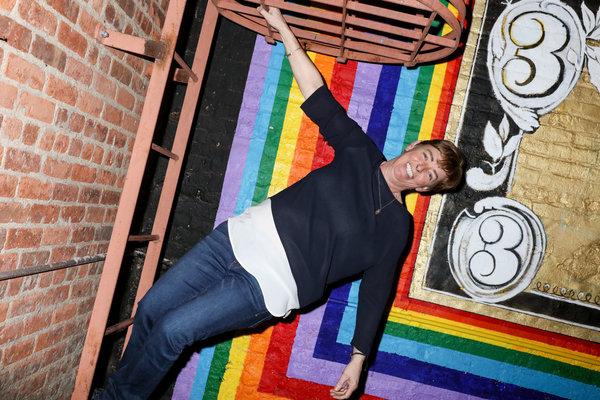It was 2 a.m. at a onetime brewery in Brooklyn, and Shangela, a multiseason star from “RuPaul’s Drag Race,” swirled and strutted in a glittery red gown, lip-syncing to “Toy,” the bubbly Eurovision winner by Netta.
As she executed a flawless death drop, a deafening roar rose from the crowd of 400, a mix of gender-nonconforming Brooklyn club kids and muscular men in tank tops, leather harnesses and tight jeans, who recorded her every move with their phones.
Similar scenes unfold every weekend at 3 Dollar Bill, a massive space in East Williamsburg that bills itself as the largest L.G.B.T.-owned and -operated nightclub in New York City. It opened last year and first made a splash with a popular party called Sutherland, and has since expanded to include events hosted by night life veterans like Susanne Bartsch, comedy nights and even a flea market.
It may surprise clubgoers to learn that the person behind all this debauchery is a petite middle-aged former bartender from Ireland, who can often be found wielding a broom or a paintbrush at the club. To her, 3 Dollar Bill is more than just another gay bar.

Brenda Breathnach, an owner of 3 Dollar Bill, began her night life career as a bartender in Ireland.CreditRebecca Smeyne for The New York Times
“I don’t have kids, so I want this place to be my legacy,” said Brenda Breathnach, 54, on a recent Saturday night in her spotless basement office at the club. “I can see it being a fabulous queer place.”
Her unlikely journey from Irish immigrant to night life impresario began in 1994, when she left Dingle, a small port town in Ireland, to work with her brother at a pub in the Bronx called An Beal Bocht Café. She stayed there for a decade but yearned for a place of her own. In 2004, she took over an Irish sports bar nearby and renamed it Dr. Gilbert’s, after an Irish song. It was not a great fit.
“I was gay and I was sober, and I just wasn’t liked,” Ms. Breathnach said. “I took over, but they never took to me.”
One day in 2011, while scanning Craigslist, she saw a for-sale posting for a Manhattan bar. It was for the Phoenix, a divey gay bar on East 13th Street in the East Village. “The Phoenix was dead,” she said. “I went in there on a Friday evening, and there were two customers.”
She bought the bar, and after giving it a pub-style makeover and a fresh coat of paint, brought it back to life. And, unlike in the Bronx, her new customers embraced her.
Everyone, she said — “the old people and the young people” — was grateful. They “were always telling me they were very thankful to have that space,” Ms. Breathnach said.
The experience left her wanting more, so she began to search for a bigger place. Working with two business partners from An Beal Bocht Café, she came across the former Otto Huber Brewery on Meserole Street, about a block away from the Montrose L subway station. Dating from the 1860s, the complex of enormous red brick buildings had brewed a variety of lagers until it shuttered in the 1950s.
Though her partners thought the space was too big and needed a daunting amount of work to get it up to code, her enthusiasm won them over and they signed a 25-year lease. After a two-year gut renovation, a new sound system and lighting, the club opened last June. The 10,000-square-foot space features a raw concert hall with 50-foot ceilings, disco lights and a triangular stage.
The first party, Sutherland, took off immediately and generated a lot of buzz, both positive and negative, for its strict policies of no phones and no photos. (Patrons had to check their phones or seal them in special pouches.) “It’s a great, magical digital detox,” Tad Haes, one of the founders, said in an article in Out magazine.
With seven nights a week to fill, Ms. Breathnach began looking to diversify her lineup in the fall. Around that time, Frankie Sharp, 38, a promoter who hosted the popular Westgay party in the West Village, visited the club and was impressed. “It reminded me of an illegal warehouse space that was legal,” Mr. Sharp said. “It could be for theater, a cabaret, immersive theater, a live band, a place you record podcasts.”
The two hit it off. “It was really amazing how we just bonded,” Ms. Breathnach said. “He wasn’t drinking, either, and that meant something to me. He knows parties and he knows a lot of the big-name drag queens, rappers and a lot of people I don’t know.”
In December, Mr. Sharp rebooted Westgay there. He also brought in Ms. Bartsch, the long reigning queen of downtown night life, and Ty Sunderland, a younger promoter known for his Heaven on Earth party at China Chalet.
“It’s amazing I’m doing parties in Brooklyn,” said Ms. Bartsch, who hosts a monthly party at 3 Dollar Bill called Play Now. “I never thought I would, but here I am.” She, too, was charmed by Ms. Breathnach’s down-to-earth, motherly manner. “She’s not some bottle service, cocaine-snorting owner,” Ms. Bartsch said.
In addition to hosting the big parties, Ms. Breathnach wants 3 Dollar Bill to serve as an L.G.B.T. community space, with workshops for dance, music and art. She considers it all payback for those grateful patrons at Phoenix.
“I could be in 20 Irish bars and nobody’s going to say, ‘Thank you for having this bar for me,’” she said. “There’s no way I would open another straight bar.”







